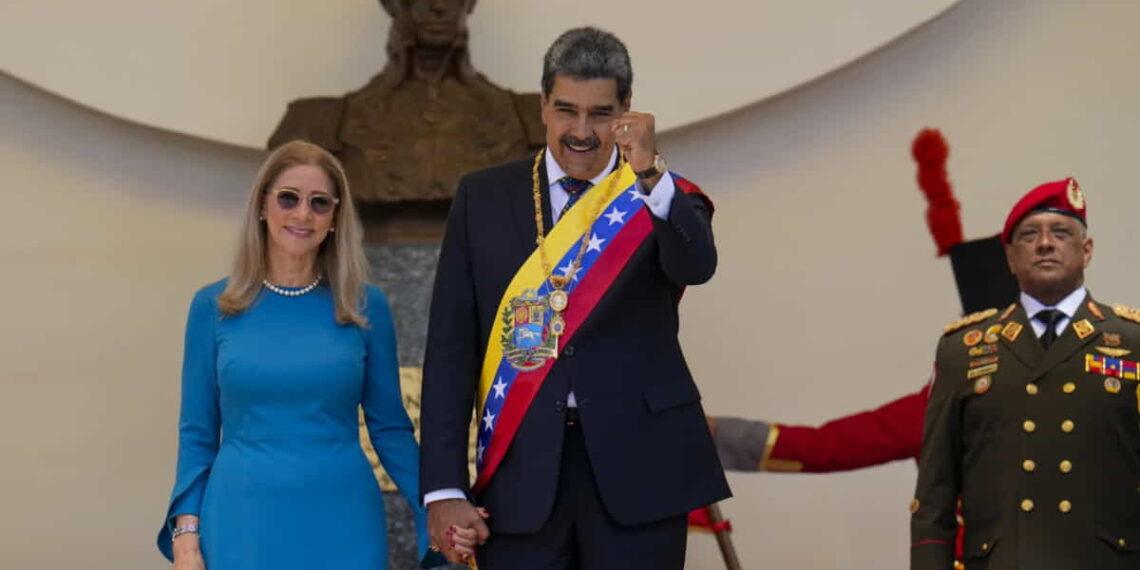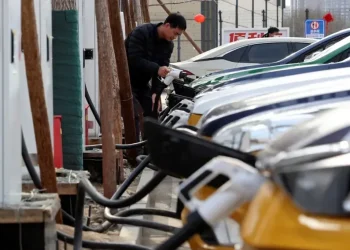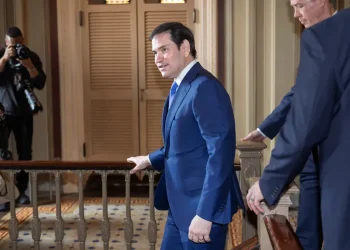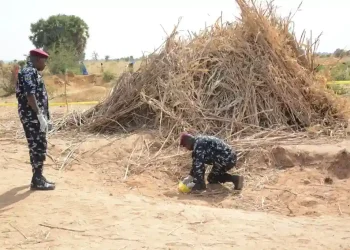Maduro’s Inauguration Sparks Protests and Global Condemnation
Venezuelan President Nicolás Maduro was sworn in on Friday for a controversial new term, extending his grip on power amidst mounting protests and widespread international criticism. Many accuse Maduro of stealing last year’s election, which has been deemed fraudulent by foreign observers and opposition leaders.
A Heavily Guarded Ceremony
The inauguration took place at Venezuela’s legislative palace under tight security, with military forces on high alert. Maduro delivered a fiery speech to a crowd of supporters wearing pro-Maduro shirts, who gathered in nearby streets and plazas.
Framing himself as a biblical David against a global Goliath, Maduro accused the U.S. and other nations of attempting to incite a “world war” by opposing his rule. “I have not been made president by the government of the United States, nor by pro-imperialist governments of Latin America,” he declared. “My power emanates from history and the people. To the people, I owe my whole life, body, and soul.”
Protests and Opposition Crackdown
Maduro’s swearing-in stood in stark contrast to scenes of unrest. On Thursday, hundreds of Venezuelans took to the streets to protest his alleged power grab. Among them was María Corina Machado, a prominent opposition leader who emerged from hiding to rally against Maduro.
Machado claimed she was briefly detained after the protest, describing a chaotic incident in which security forces fired shots, dragged her from a motorcycle, and initially announced they were taking her to prison. Instead, she said, they forced her to record a video denying her detention before releasing her. Maduro’s government dismissed her claims as opposition propaganda, sharing a brief video of her during the incident as supposed evidence.
“Today, Maduro didn’t put the sash on his chest. He put a shackle on his ankle, which will tighten every day,” Machado stated in a video on Friday.
Global Rejection of Maduro’s Presidency
While Maduro’s allies celebrated in Caracas, global condemnation grew. The United States, Canada, the U.K., and the European Union imposed fresh sanctions on over 20 Venezuelan officials, accusing them of undermining democracy. Among the sanctioned were Supreme Court justices, electoral officials, and high-ranking cabinet members.
The Biden administration extended special protection for 600,000 Venezuelan migrants in the U.S. and raised its bounty for Maduro and his associates. Rewards for information leading to Maduro’s arrest increased to $25 million, with a new $15 million bounty placed on Defense Minister Vladimir Padrino.
Opposition Leader Edmundo González Speaks Out
Edmundo González, Maduro’s challenger in last year’s disputed election, denounced the inauguration from exile in the Dominican Republic. In a video message, he thanked international allies for their support and reaffirmed claims that he won the election by a landslide.
“Maduro has crowned himself a dictator,” González stated. “The people don’t support him, nor does any government that can call itself democratic.”
González fled to Spain in September after threats of arrest but vowed to return to Venezuela when safe. His plans to take the oath of office on Friday were thwarted after Maduro closed Venezuela’s airspace and sealed the border with Colombia.
Election Fraud Allegations
The 2018 reelection that solidified Maduro’s rule was widely condemned as fraudulent. Opposition leaders accused Maduro of rigging last year’s vote after tally sheets from 85% of voting machines indicated a landslide victory for González. Independent observers, including the United Nations and Carter Center, verified the data, but Maduro’s loyalist electoral authorities declared him the winner without releasing detailed results.
Maduro’s request for a court audit, approved by the government-controlled judiciary, unsurprisingly reaffirmed his victory. Protests erupted nationwide, resulting in over 2,000 arrests, 20 deaths, and dozens of foreign detentions, including U.S. citizens.
Celebrations and Isolation
Despite domestic unrest and international rejection, Maduro’s supporters celebrated his inauguration. “I’m happy,” said Maricarmen Ruiz, 18, tearfully expressing relief that González wasn’t “imposed” as president.
Attendees at the ceremony included Nicaragua’s Daniel Ortega and Cuba’s Miguel Díaz-Canel. However, key allies like Colombia’s President Gustavo Petro skipped the event, citing concerns over human rights violations, including the arrest of opposition figures.
A Nation in Turmoil
Maduro’s rule continues to face fierce opposition at home and abroad. His inauguration, marred by protests, international sanctions, and accusations of dictatorship, underscores Venezuela’s deepening crisis. Meanwhile, González remains in exile, waiting for the moment he deems safe to return.
This article was rewritten by JournosNews.com based on verified reporting from trusted sources. The content has been independently reviewed, fact-checked, and edited for accuracy, neutrality, tone, and global readability in accordance with Google News and AdSense standards.
All opinions, quotes, or statements from contributors, experts, or sourced organizations do not necessarily reflect the views of JournosNews.com. JournosNews.com maintains full editorial independence from any external funders, sponsors, or organizations.
Stay informed with JournosNews.com — your trusted source for verified global reporting and in-depth analysis. Follow us on Google News, BlueSky, and X for real-time updates.














